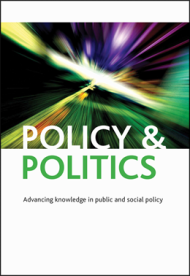Sarah Ayres, Centre for Urban and Public Policy Research
Despite growing recognition across the major political parties that the territorial system of government in England is in need of change, there remains no clear and shared imagery on how England should be governed within a devolved UK. Recent changes to the political and economic landscape of the UK, especially those arising from the economic crisis and the Scottish referendum result, have made it more vital than ever before to address the English Question in a cohesive manner. Enhanced devolution in England’s territories is a potential solution to the English Question. I make three central claims about what needs to happen if devolution in England is to work. My views are based on my own research that has examined English governance over the past decade (see –http://www.bristol.ac.uk/sps/people/sarah-a-ayres/overview.html).
First, past attempts to address the English Question through enhanced decentralisation in England have been piecemeal, reactionary and have, therefore, proved unsustainable. The Prime Minister’s announcement, shortly after the referendum result, of constitutional reform at breakneck speed is risky and underplays the complexities of sub-national English governance.
Second, UK government remains highly centralised despite past and present government rhetoric around decentralisation, local discretion and enhanced fiscal autonomy. Any constitutional settlement must address highly differentiated preferences for devolution and decentralisation across Westminster and Whitehall departments as well as deep-rooted cultures that promote centralism.
Third, any moves to address the English Question must deal with England in its entirety and not focus on favoured geographies or localities at the expense of less favoured areas.
The Need for a Comprehensive Response
The motives for enhanced devolution and/or decentralisation centre on three main areas (i) boosting economic productivity (ii) public service improvement and efficiency and (iii) pressures for enhanced democracy. These themes were also evident at the start of New Labour’s devolution project in 1997. The key motivations for decentralisation have therefore remained consistent – as too have the main barriers. These include Whitehall’s differentiated approach to decentralisation, highly variable local governance capacity, a lack of resources for local investment and a continued inability to join up policy in any meaningful way at a sub-national level. The assumption that these problems are easily solved or can be quickly overcome this side of a general election is flawed. The Government’s presumption of a quick fix post the referendum result raises fears that it has not fully understood the challenges of a post devolution UK. Recent evidence submitted to the McKay Commission (2013), for example, is a stark reminder of the political complexity of this issue.
Is Westminster and Whitehall Ready for Devolution in England?
The feasibility of enhanced devolution in England rests on political and ideological grounds and on the willingness of the Centre to accommodate a new constitutional settlement. But, how might this be enacted systematically across Westminster and Whitehall departments with different levels of support for decentralisation? One doubts that there has been a drastic change in the mood music across the civil service or amongst politicians since the Scottish referendum. This raises a question about whether the Government’s renewed commitment to devolution in England is any more feasible than past attempts to promote local autonomy and discretion under, for example, regionalism or localism. There is a danger that Westminster’s disposition for centralism will result in a settlement that creates the illusion of change without too much cost to its power and political priorities.
Plans for enhanced devolution are likely to lead to greater geographical variations in policy design, delivery and evaluation. However, Whitehall has struggled to deal with variation between, for example, eight English regions and more recently 39 unelected Local Enterprise Partnerships (LEPs). This issue is likely to be compounded by recent public spending cuts across Whitehall. A reduced administrative capacity at the Centre has led to the greater use of ‘ad hoc’ procedures and ‘softer’ processes for managing inter-governmental relations as opposed to formal arrangements. More fluid structures are viewed as more suited to deal the complexity of localism and the problems of managing the sub-national tier with diminished resources. An issue will be whether these structures and procedures are robust enough to support future plans for enhanced devolution.
A Fair Constitutional Settlement for All
The final point I make is that any planned response to the English Question will need to deal with England in its entirety. The Coalition government’s territorial focus in England on Cities and LEP areas has resulted in winners and losers due to different socio-economic conditions and variable collaborative capacities. Recent research indicates that many Whitehall civil servants referred to the ‘City Deal’ agreed with Manchester as the ‘aspirational model’ for greater sub-national control over public policy and finance. Nonetheless, the same officials also acknowledged that, for some, emulating this model would be a significant challenge and for others, impossible. Consequently, the variable capacity of emerging local governance arrangements has the potential to widen regional economic disparities further and lead to a greater sense of alienation from those areas that do not qualify for City Mayors, City Deals or Enterprise Zones. Heightened tensions between localities as a consequence of place based competition and more visible inequalities will do little to appease growing public demand for a fairer constitutional settlement.
Devolution in England must be fair to all citizens no matter where they live. However, plans, for example, to empower cities raise important questions about social justice and spatial equality. Any new constitutional settlement cannot ignore rural or less buoyant areas, for example. Devolved politics is producing variable social citizenship rights in different parts of the UK. It will be essential to consider how policy divergence, variable economic benefits and differentiated inter-governmental relations will impact on localities and citizens.
Conclusion
In sum, attempts to address the English Question through enhanced political autonomy in England have been the consequence of a set of reforms that lack an underlying logic and which are littered with contradictions. The big constitutional question about the future of the England post devolution in London and the devolved territories has not been addressed and there is no consensus in government about what the final constitutional settlement should be. New Labour’s reform agenda stalled at the 2004 North East referendum and, in the absence of a constitutional master plan, the outcome has been a set of reactionary and incremental adjustments that lack strategic direction, buy-in and focus. Moving forward the challenge for government will be to develop a solution based on realism, pragmatism and sustainability and to avoid politically motivated and reactionary policy this side of the general election.
Sarah Ayres is Reader in Public Policy and Governance at the University of Bristol, UK, and is also Co-Editor of Policy & Politics.
This was originally published on the Policy&Politics blog



